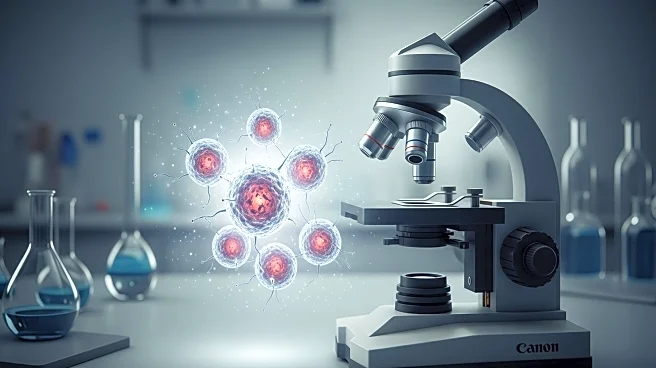What's Happening?
Recent research has highlighted the impact of aging on Leydig cells, which are crucial for hormone production in the testes. The study, conducted by Jiayu Huang, Lu Sun, Yuehan Yin, Huan Yang, and colleagues, reveals that the stiffness of the extracellular matrix in aging mouse testes increases, leading to impaired stem Leydig cell (SLC) homeostasis. This stiffness promotes PIEZO1-mediated calcium influx, mitochondrial dysfunction, and reactive oxygen species (ROS) production. The researchers used atomic force microscopy to measure testicular tissue stiffness in mice aged 2 months, 12 months, and 24 months, finding a correlation with decreased proliferation and differentiation of SLCs. The study also demonstrated that culturing SLCs on softer gels enhanced cell proliferation, while inhibiting mechanosensitive signal transduction improved differentiation and testosterone production.
Why It's Important?
The findings are significant as they provide insights into the mechanisms of reproductive aging, particularly how biomechanical properties affect hormone production. Understanding these processes could lead to new therapeutic strategies for age-related reproductive issues. The study suggests that manipulating the tissue environment could enhance Leydig cell function and hormone production, potentially benefiting individuals experiencing age-related declines in testosterone levels. This research could have broader implications for the development of treatments targeting age-related hormonal imbalances, impacting public health and aging populations.
What's Next?
Future research may focus on further exploring the mechanosensitive pathways involved in Leydig cell function and how they can be modulated to improve hormone production in aging individuals. The application of ROS scavenging molecules like NAC in therapeutic settings could be investigated to enhance mitochondrial function and cell proliferation. Additionally, studies could explore the potential for translating these findings from animal models to human applications, aiming to develop interventions that mitigate the effects of aging on reproductive health.
Beyond the Headlines
The study raises ethical considerations regarding the manipulation of biological processes to counteract aging effects. It also highlights the importance of understanding the complex interactions between cellular environments and aging, which could lead to advancements in regenerative medicine. The research underscores the need for interdisciplinary approaches combining biomechanics, molecular biology, and aging studies to address age-related health challenges.









